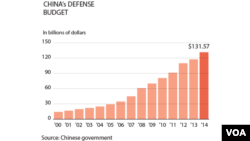China's defense spending will increase by 10 percent this year, the latest double-digit increase for the world's largest standing military.
The figure announced Wednesday by National People's Congress spokeswoman Fu Ying means China's officially declared military budget would amount to about $145 billion in 2015.
The official figure will be released Thursday in a report by the largely ceremonial parliament, Fu said at a news conference.
The increase would actually represent a drop from last year, when military spending increased by 12.2 percent. But it would be the fifth straight year that the defense budget has increased by double digits.
Many analysts have long suspected China spends much more on defense than it officially declares, both because of a lack of transparency and other factors such as corruption.
Washington and its allies accuse China of using its rising military strength to bully neighbors in the East and South China Seas with which Beijing has territorial disputes.
Beijing has rejected the accusation, saying it is only trying to upgrade equipment and expand defensive capabilities for its military, which has 2.3 million members.
"Compared with other powers, China has been taking a tougher road in its military modernization because we have to depend on ourselves for the research and development of most of our military equipment and a lot have to be started from the very basic level," Fu said. "Fundamentally speaking, China's defense policy is defensive in nature. This is clearly defined in the constitution. We will not easily change this direction and principle."
Many of China's neighbors remain unconvinced, and have also ramped up spending. Japan this year increased its military budget by 2.8 percent to a record $42 billion. India's defense budget rose by 11 percent to $40 billion.
Though China has steadily increased its defense spending, Beijing still only spends a fraction on its military compared to the United States. Washington has proposed spending about $600 billion on defense and overseas conflicts this year.









